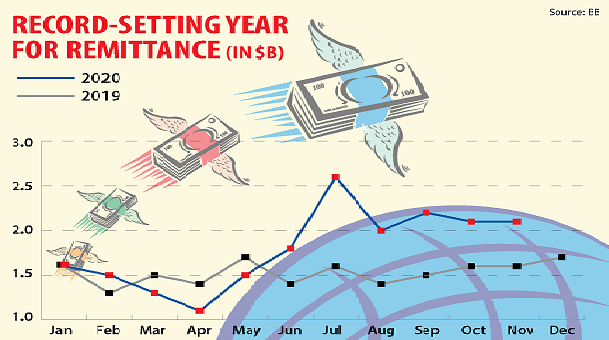The global coronavirus pandemic brought a big blow to the country’s economy and businesses as well as people’s livelihood in 2020 but it was a year of record for remittance inflows and foreign exchange reserves.
The country continues to see a robust inflow of remittance amid the ongoing pandemic despite the experts and international organisations’ initial projections that the receipts could decline drastically owing to the impact of COVID-19.
In April, the World Bank had forecasted that remittance inflows to Bangladesh may plunge as much as 22 per cent in 2020 to about $14 billion.
And then in July, the Asian Development Bank had made a similar grim forecast: Bangladesh would be among the five worst-hit developing Asian economies in terms of remittance inflows.
In the worst-case scenario, Bangladesh's remittance will decline 27.8 per cent from its 2018 level.
But, it was surprising that the country’s remittance earning hit a new record in the current year.
Bangladesh received $19.6 billion as remittance during January to November of the current year, surpassing last year’s full-year receipts of $18.3 billion, which was a record, according to the data from the central bank.
The remittance had hit the new record mainly due to the 2 per cent cash incentive on inflows through the official channel, said Md. Serajul Islam, spokesperson of the Bangladesh Bank.
The objectives of the incentive, when introduced in July last year, were to mitigate the burden of increased expenses in sending foreign remittance and to encourage the Bangladeshi diaspora to remit more money through the legal channels, said Islam, also an executive director of the BB.
However, remittance declined between February and April when the pandemic was putting down its roots all over the world.
From May onwards, the inflows started to increase as countries all over the world gradually started to ease their movement control orders to flatten the curve on coronavirus.
The inflow of remittance hit the single-month record in July as migrant workers sent home $2.6 billion.
July's inflows were up 62.5 percent from a year earlier and 42.1 percent from the previous month.
Remittance inflows rose 35.9 percent in August, 45.6 percent in September, 28.1 percent in October and 33.7 percent in November from a year earlier.
The collapse in the hundi system, an illicit cross-border transaction network, thanks to the travel ban brought on by the raging coronavirus could explain the gush of remittance, said Zahid Hussain, a former lead economist of the World Bank’s Dhaka office.
The hundi network was moored on international travel, import business and medical tourism. All have been in the slow lane since the pandemic began in February.
“But the expatriate Bangladeshis still need to send in money home and they turned to the legal channel,” Hussain added.
Although the Bangladeshi expatriates are facing various disruptions due to the struggling economies they reside in, they did not stop sending money to their relatives in the country, said Zaid Bakht, chairman of Agrani Bank.
As a result, the inflow of remittance has increased in the current year even amid the pandemic.
The inflow of remittance would maintain a standard flow in the upcoming days as migrant workers are already used to the legal channels and getting benefits due to the incentives, said Bakht, also the research director of the Bangladesh Institute of Development Studies.
Ahsan H Mansur, executive of the Policy Research Institute of Bangladesh, echoed the same.
“There will not be much growth in remittance in the upcoming days but it would not decline.”
The technological transformation seen in recent times that has made receiving remittance within minutes via mobile financial services might have posed itself as a viable alternative to hundi amid the pandemic, said Mansur, also the chairman of BRAC Bank.














